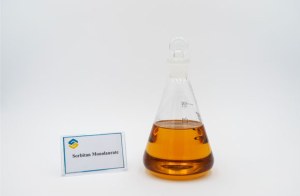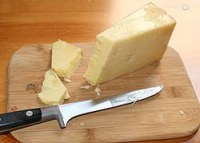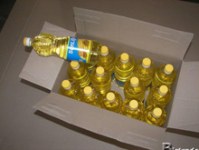Sorbitan Esters
Sorbitan esters and Polysorbates as nonionic offer many advantages over ionic surfactants including increase stability, enhance flexibility and provide wider compatibility. They are stable in mild acids, alkalis and electrolytes and do not react with ionic ingredients or actives.
Sorbitan esters are nonionic lipophilic surfactants that are commonly used as water-in-oil (W/O) emulsifiers and stabilizers. Sorbitan fatty acid esters are produced by esterification of dehydrated sorbitol (sorbitan) with a variety of fatty acids. Sorbitol is a sugar that can be obtained by the reduction of glucose or derived from corn, potatoes, etc. The fatty acids commonly used to synthesize sorbitan esters include lauric acid, palmitic acid, stearic acid, and oleic acid.
Sorbitan esters used as non ionic surfactants are effective for various functions. Our range of surfactants is used in a variety of settings, for example, as an emulsifier in food, a stabilizer in a cosmetic cream formulation, or a cosolvent and antirust agent for petroleum and oil. These surfactants are sourced from vegetables and vegan friendly. They are safe and nontoxic as food additives when used according to regulations.
Our range of span sorbitan esters has a hydrophilic-lipophilic balance (HLB) between 1.6 - 8.6, which make them dissolvable in polar organic solvents and oils. When used in combination with varying proportions of ethoxylated sorbitan esters (polysorbate) that have an HLB range between 10.0 – 16.7, it creates more versatile surfactants; which can produce W/O or oil-in-water (O/W) emulsions with varying levels of consistencies, expanding the possible applications of these surfactants.
FAQs of Our Sorbitan Ester
What is the difference between non-ionic and ionic surfactants?
Compare to ionic surfactants, non-ionic surfactants are less sensitive to acidity or alkalinity.
What is a water-in-oil (W/O) emulsifier?
In water-in-oil emulsion, the hydrophilic parts of emulsifiers surround the water droplets and expose their lipophilic portions to the oil phase. This allows water droplets to suspend in oil environment.
What is sorbitan ester made of?
Sorbitan ester is composed of sorbitol-derived hexitol anhydrides aka sorbitans and various fatty acids (lauric acid, palmitic acid, stearic acid, and oleic acid, etc.). Polyoxyethylene sorbitan fatty acid ester is attached to sorbitans through esterification reactions.
Is sorbitol the same as sorbitan?
Sorbitol is a sugar (crystalline hexahydric ) that can be sourced from plants, such as corns and potatoes. When sorbitol undergoes a dehydration process, where one water molecule is removed, it creates an anhydride called sorbitan.
What is HLB value?
HLB value is the abbreviation for hydrophilic-lipophilic balance, it is the ratio between the hydrophilic portions and lipophilic portion of a surfactant. It is represented by a number between 1 and 20. An HLB value less than 6 indicates that the surfactant favors W/O emulsion; an HLB value greater than 8 favors O/W emulsion. HLB values in between 7 and 9 indicate that the surfactants are good wetting agents.
Is sorbitan ester safe?
Sorbitan esters are widely used in cosmetics, food, medicines. They are generally considered as non-toxic and non-irritant. They are considered to be safe cosmetic ingredients.2 According to the World Health Organization (WHO), sorbitan esters composed of lauric acid, palmitic acid, oleic acid and stearic acid are safe to consume as food additives.1 The group ADI value of these sorbitan esters is 0-25mg/kg body weight/ day.1 Acute and long-term studies have shown that sorbitan esters are non-toxic via ingestion.2 During digestion, sorbitan esters are hydrolyzed into sorbitan and fatty acid; the fatty acid moiety is absorbed and metabolized, whereas the sorbitan moiety is excreted through urine, feces or respiration.
Contact : Cao Bonnie, 020 87568805
Good deal: buying from seller
We invite you to read our terms of use. You can also visit our FAQ section and see our information section on the risks associated with counterfeiting.
|
This page is about importers and exporters of Sorbitan Esters Search in a category : Raw materials Search in a category : sorbitan, esters |
Thursday, August 27, 2015
Mozzarella Cheese | Fresh Cheese | Cheddar Cheese | Cheese, Full Cream Milk Powder HEESE Fat Content (%): 45 MAX Cow's milk made 100% real Mozzarella Cheese Fresh Mozzarella Cheese Shredded 100% made from US cow's milk General Specifications FINISHED PRODUCT ANALYSIS: A....
N.N.P.T As Ingeniering
- 73110 - Nakornpathom
- +66 6 19 70 32 56
Saturday, July 14, 2007
Kaskat Ltd was founded In 1997 and is today one of the biggest suppliers of milk powders and milk proteins in Poland, also in Central-Eastern Europe. We are offering the following products with Belarussian and Ukrainian origin: Polish origin: Moreover we are producers of these products...
Tuesday, July 14, 2015
Quantity : 50MT - Price : 400usd
Nous sommes des fournisseurs d'huile de tournesol raffinée Produit: Type de traitement: Raffiné Utilisation: comestibles (cuisson) Origine: Thaïlande Nom du produit: Huile comestible de la graine de tournesol raffinée Propres à la consommation humaine spécifications: Poids...
S.D.P
- 10110 - bangkok
- +66 2 62 61 74 69
- +66 9 62 91 74 69









